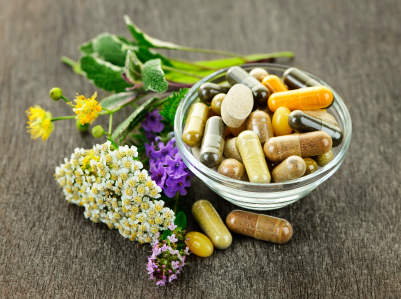Herbs and Your Kidneys—Beyond Seasoning Your Food
 Supplements made from herbs promise to prevent or cure many ailments, including kidney disease. Is there any truth to it? Or are people with chronic kidney disease (CKD) falling victim to the herbal products industry who makes money from unproven promises? When you run across claims a product will cure or slow kidney disease there are a few things to remember. Herbal supplements are not regulated by the FDA. They fall into the category of dietary supplements and require no testing. This means consumers may be the test group—and may be at risk since there is no required safety or effectiveness testing or regulation of herbal products.
Supplements made from herbs promise to prevent or cure many ailments, including kidney disease. Is there any truth to it? Or are people with chronic kidney disease (CKD) falling victim to the herbal products industry who makes money from unproven promises? When you run across claims a product will cure or slow kidney disease there are a few things to remember. Herbal supplements are not regulated by the FDA. They fall into the category of dietary supplements and require no testing. This means consumers may be the test group—and may be at risk since there is no required safety or effectiveness testing or regulation of herbal products.
Several postings on herbal products and kidney disease were of interest to me this week. Check out these resources, especially if you’re taking herbal supplements.
Nephrologist blogger Dr. Veeraish Chauhan wrote a post this week “Can certain herbal medications treat chronic kidney disease (CKD)?”after one of his patients inquired about using the herb nettle leaf to treat kidney failure. The doctor searched medical literature and the web looking for research data to show benefit or harm from this herb. His advice is to skip the nettle.
 The cover of Nephrology News and Reviews (June 2013) features “The Risks of Dietary Supplements for CKD Patients”. The article is titled “Persistent Hyperkalemia? Maybe it’s the Noni Juice, not the Orange Juice” by Jane H. Greene, RD, CSR, LDN. She explores supplements commonly used in CKD, and includes lists of herbs that may be toxic to the kidneys (wormwood plant, Black Pearl, periwinkle and more) or harmful to kidney patients (blue cohash, cascara, Noni juice and more). Greene also includes a list of websites with additional information on herbs. One I think is especially helpful is the National Center for Complementary and Alternative Medicine (NCCAM) page on herbs.
The cover of Nephrology News and Reviews (June 2013) features “The Risks of Dietary Supplements for CKD Patients”. The article is titled “Persistent Hyperkalemia? Maybe it’s the Noni Juice, not the Orange Juice” by Jane H. Greene, RD, CSR, LDN. She explores supplements commonly used in CKD, and includes lists of herbs that may be toxic to the kidneys (wormwood plant, Black Pearl, periwinkle and more) or harmful to kidney patients (blue cohash, cascara, Noni juice and more). Greene also includes a list of websites with additional information on herbs. One I think is especially helpful is the National Center for Complementary and Alternative Medicine (NCCAM) page on herbs.
An herbal remedy used for centuries and linked to kidney failure was explored in a USA Today article by Dan Vergano “Herbal ‘remedy’ may trigger widespread kidney failure”. He sites evidence indicating a link to herbs and higher rates of kidney failure in certain areas of the world.
A couple of supplement resources in my personal library include the American Diabetes Association book “Complementary & Alternative Medication (CAM) Supplement Use in People with Diabetes” by Laura Shane-McWhorter, PharmD, and The American Dietetic Association book “The Health Professional’s Guide to Popular Dietary Supplements” by Allison Sarubin Fragakis, MS, RD and Cynthia Thomson, PhD, RD.
When it comes to herbs, it’s not only about seasoning your food. Herbs may have medicinal effects, and may impact your kidney function. Be sure you discuss all herb products you use or are considering to use with your doctor and dietitian, and go to valid sources to educate yourself on herb safety.
Kidney diet resources from DaVita.com

Recent Comments